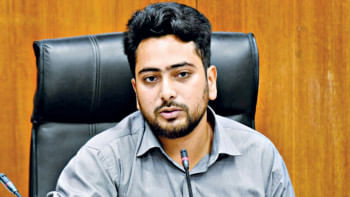Film Certification Board: Ambitious plans, lingering challenges

The newly formed Bangladesh Film Certification Board, established just two months ago, has already sparked critical debate. Central to the discussion are concerns about its ability to implement the Bangladesh Film Certification Act, 2023, and the specific guidelines it follows in decision-making. While its formation is seen as a progressive step, a lack of clarity in its operational framework hampers its work.
In an effort to understand the challenges and tentative guidelines, The Daily Star reached out to board members and stakeholders. Their insights highlight the complexities of transitioning from the long-standing censor board to a modern certification body.
From censorship to certification: A historical context
The announcement of the Film Certification Board on September 22 this year marked a significant milestone in Bangladesh's cinematic landscape. The Ministry of Information and Broadcasting replaced the Bangladesh Film Censor Board with the Bangladesh Film Certification Board, reshaping decades-old regulatory practices.
Tracing the history of film censorship in Bangladesh reveals a long journey-- starting with the East Bengal of Film Censors (1952) during the pre-independence era, evolving into the Central Board of Film Censors (1963), and eventually becoming the Bangladesh Film Censor Board (1972) post-independence. Now, the newly formed Bangladesh Film Certification Board aims to modernise film regulation and align it with international standards.
Since its formation, the board has cleared over 10 films, including "Voyal", the country's first A-grade film. While this milestone represents progress in age-based classification, the journey toward the system's refinement remains a work in progress.

Tentative guidelines and challenges
The certification board has been striving to establish a comprehensive framework. However, a board member, who wishes to remain anonymous, revealed that the draft guidelines submitted to the Ministry of Information and Broadcasting remain undisclosed even to board members. This opacity fosters uncertainty regarding the standards the board is expected to uphold.
Meanwhile, Md Abdul Jalil, vice chairman of the Film Certification Board, confirmed the development, stating, "The Ministry of Information and Broadcasting has already formed a technical committee, which will be responsible for reviewing the draft we have submitted."
Actress Quazi Nawshaba Ahmed, board member and animal rights advocate, emphasised the need for stricter regulations on using animals in films. "Many remain unaware of the silent suffering endured by animals during productions," she explained. "Amidst the chaos on set, who notices the fear, pain, or thirst of a waiting animal? Unlike actors, they cannot call for help."
She proposed mandatory on-set veterinary professionals to certify the welfare of animals before granting a film clearance. If implemented, this regulation would be a landmark in the country's film certification system.
Nawshaba also suggested requiring producers to provide a clearance certificate confirming full payment to all cast and crew members, a standard practice internationally. "Our industry struggles with payment issues," she noted. "Requiring a No Objection Certificate (NOC) from technicians and cast would ensure accountability."
She also highlighted the need to enhance disclaimers regarding smoking and drinking in films. She pointed to practices in neighbouring countries, where films begin with advertisements highlighting the dangers of tobacco and alcohol. "These disclaimers should also appear during intermissions and at the film's conclusion," she added.
Another proposed rule addresses the environmental impact of filmmaking, specifically the use of plastic on set and during the production process. The artiste stressed the importance of raising awareness about the harmful effects of plastic on the environment and suggested advocating this message using the certification framework.
Structural concerns and criticisms
Director Khijir Hayat Khan, another Board member, expressed dissatisfaction with the board's composition, particularly the 50 percent representation of government officials. "This ratio should be reduced to 20 percent to ensure impartial decision-making," he asserted.
Khijir criticised certain sections of the Bangladesh Film Certification Act, 2023, as restrictive and outdated. For instance, Section 12 allows the board to reject a film based on subjective criteria like incoherent storytelling or poor cinematography.
"These subjective criteria can easily become tools for censorship," Khijir warned.
Another one is Section 14, which empowers district magistrates to halt a film's release if deemed contrary to the public interest. Khijir argued that such provisions are incompatible with a professional film industry aspiring to meet international standards.
Another issue raised by Khijir concerns collaborative projects. He emphasised the need for equitable collaboration in joint productions, ensuring equal involvement of technicians and cast from both participating countries to ensure fairness and mutual benefit.
A ray of hope amidst challenges
Despite the concerns and criticisms, some stakeholders remain optimistic. Film critic Dr Zakir Hossain Raju, who is also a board member, highlighted the shift's potential. "The censor board deemed all cleared films suitable for all ages. The certification board introduces age-specific ratings, vital for protecting younger audiences," he explained.
While acknowledging the limitations of the Film Certification Act, 2023, Dr Raju expressed hope that these issues would be addressed promptly. "We have requested the concerned ministries to implement the guidelines as soon as possible," he said.
Legal and political considerations
The implementation of new guidelines for the Film Certification Board also raises governance-related concerns. Stakeholders worry that the absence of an elected government could stall progress.
However, Barrister Jyotirmoy Barua, who is also a human rights activist, clarified the legal process.
"The standard procedure requires at least a two-thirds majority in voting to pass an amendment in the parliament. Once passed, it requires the president's approval after being gazetted. If the president fails to respond within 15 days, the law would be enacted by default. In the absence of a parliament, the president can enact laws through direct approval," he stated, suggesting that the procedure would require even less time in the current situation and political uncertainties should not hinder its implementation.
The establishment of the Bangladesh Film Certification Board is a turning point in the country's cinematic history. Its efforts to adopt international best practices and address longstanding issues—such as animal welfare, fair payment practices, and environmental awareness—are commendable. However, structural reforms and the removal of restrictive provisions in the Film Certification Act, 2023, are critical for success.
A comparative analysis of past censorship laws and the current act—such as among Censorship of Films Act, 1963, Censorship of Films Act, 1977, and the Bangladesh Film Certification Act, 2023— reveals striking similarities, with some new provisions being even more restrictive. The analysis indicates that the majority of the sections in the certification act pertain to censorship and bear no relevance to certification or rating.
In essence, censorship hinders cinema's capacity to portray society authentically. Therefore, it's crucial to establish a robust system that classifies films by age appropriateness while ensuring artistic freedom. With clear guidelines, reduced bureaucratic influence, and effective legal mechanisms, the certification board has the potential to transform Bangladesh's film industry and elevate it to international standards.

 For all latest news, follow The Daily Star's Google News channel.
For all latest news, follow The Daily Star's Google News channel. 











Comments